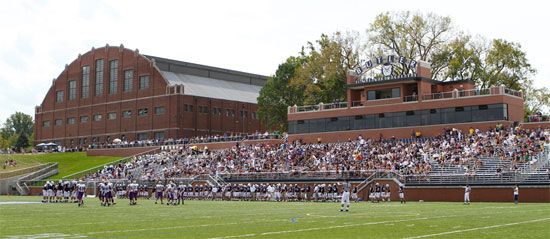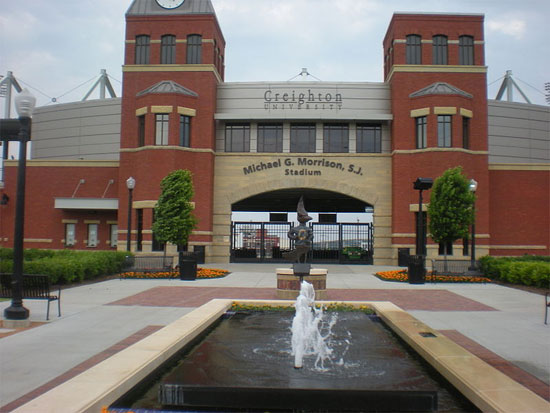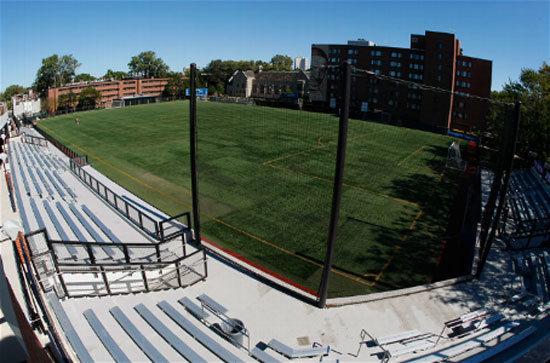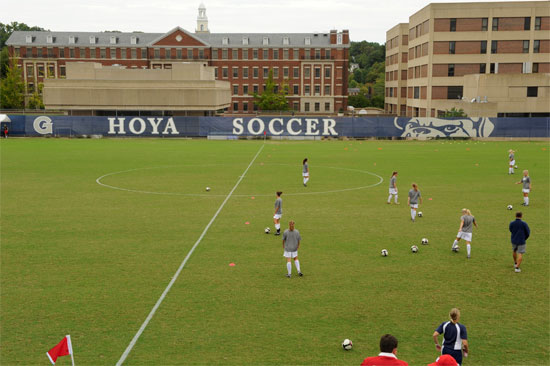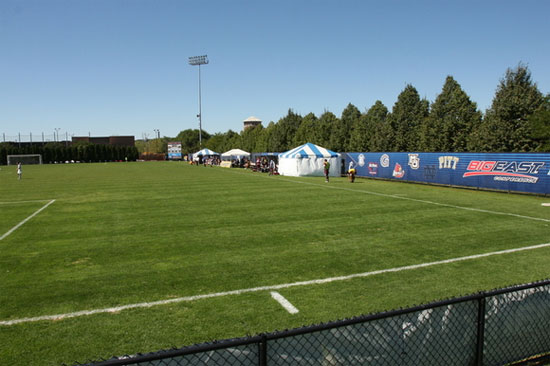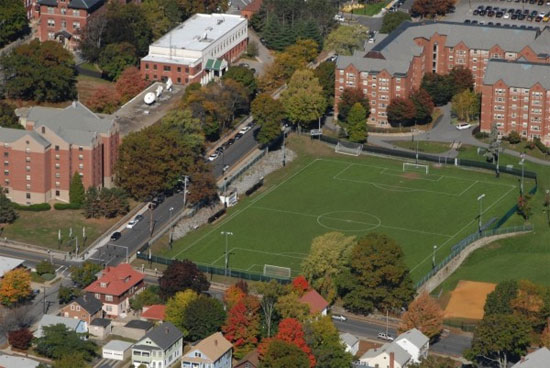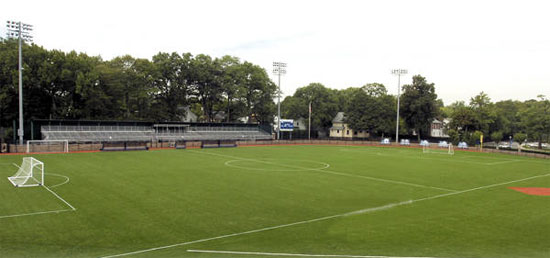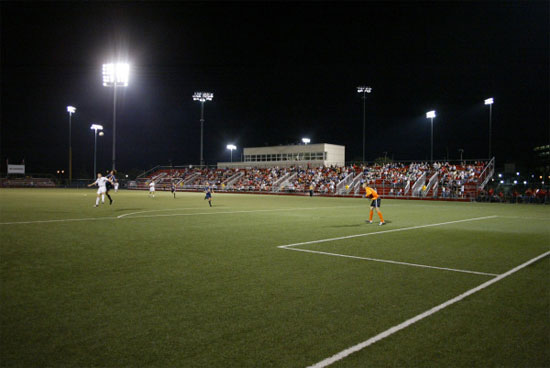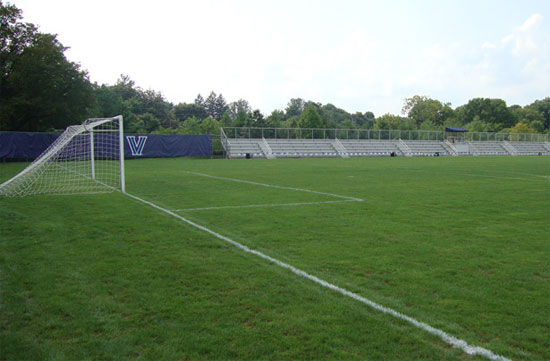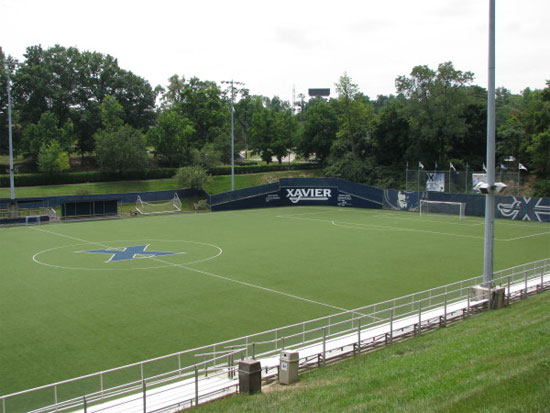When Creighton opens up Big East play in soccer this fall, they’ll be playing in an array of facilities very different from the fields the Jays are used to from their Valley days. We thought it might be interesting to take a look at where they’ll be playing when they’re on the road in the Big East, so this is the first in a series of posts doing just that — a look at soccer venues in the Big East.
| School | Facility | Year Built | Capacity | Playing Surface |
|---|---|---|---|---|
| Butler | Butler Bowl | 1928 | 6,000 | FieldTurf |
| Creighton | Morrison Stadium | 2003 | 6,000 | FieldTurf |
| DePaul | Wish Field | 1987 | 1,000 | FieldTurf |
| Georgetown | Shaw Field | 2001 | 1,625 | Natural Grass |
| Marquette | Valley Fields | 1993 | 1,600 | Natural Grass |
| Providence | Glay Field | 1976 | 1,500 | Natural Grass |
| Seton Hall | Owen T. Carroll Field | 1907 | 1,800 | FieldTurf |
| St. John's | Belson Stadium | 2002 | 2,600 | FieldTurf |
| Villanova | Villanova Soccer Complex | 1992 | 1,500 | Natural Grass |
| Xavier | Xavier Soccer Complex | 2003 | 1,000 | FieldTurf |
Butler
Butler soccer calls the Butler Bowl home, a scenic venue situated adjacent to Hinkle Fieldhouse. Originally constructed in 1928, the Butler Bowl seated over 35,000 fans at one time and hosted football games against geographic rivals such as the Four Horsemen of Notre Dame and Red Grange of Illinois.
It has undergone several renovations during the last decade, adding new lights, a new pressbox, and new seating bringing the capacity down to under 6,000 with grass berms on three sides. It features an artificial surface, a necessity to keep the field in playable shape as three teams play games there — men’s and women’s soccer, as well as football (Butler fields a 1-AA non-scholarship football team in the Pioneer League).
Creighton
Creighton’s state-of-the-art Morrison Stadium opened in 2003 and features an “Arena Grass” all-weather surface that is the first of it’s kind in the U.S. It’s one of the finest soccer-specific facilities not only in the Big East, but in the entire country, and features 2,000 reserved seats in the main grandstand and nearly 4,000 general admission seats.
DePaul
An urban field in the truest sense of the word, Wish Field is nestled into DePaul’s Lincoln Park campus and is located adjacent to the Fullerton “L” station. It was renovated in 2005, adding FieldTurf, a soccer-specific press box, a new scoreboard and new bench areas. But the most impressive thing about Wish Field is that it’s a multi-purpose stadium — in the fall, it’s home to men’s and women’s soccer, and in the spring, it’s home to softball. They utilize FieldTurf trays to insert a dirt infield into one corner of the facility for softball, and replace those trays with turf for soccer.
Georgetown
Opening in 2001, Shaw Field is the home of Georgetown men’s and women’s soccer. It features a natural grass surface, and seats 1,625 fans. Before the 2012 season, it underwent major renovations that added a new scoreboard, perimeter wrought-iron fencing, a new grandstand area with chairback seating, and upgraded team and official bench shelters with a FieldTurf surface in the bench area.
Marquette
Part of a larger complex that also houses intramural fields and a track and field facility, Valley Fields has been home to Marquette soccer and lacrosse since 1993. It seats 1,600 in bleachers along one side, with an intramural field on the east side of the complex and windscreens around the other two. The natural grass field will be home to the semifinals and finals of the Big East women’s soccer tournament this fall.
Providence
The Friars play their home games at Glay Field, built in 1976, a venue that seats 1,500 and is squeezed into Providence’s Lower Campus. A new soccer and lacrosse facility was announced in April of this year, thanks to a $1 million donation from a pair of alums.
Seton Hall
Seton Hall soccer plays at Owen T. Carroll Field, which like DePaul’s home is a multi-purpose facility. Carroll Field is home to baseball as well as soccer, and is named for their former baseball coach. It’s a strange setup, with the edge of the infield butting up against the sideline of the soccer pitch; for soccer that means there’s seating on only one side, though at 1,800 seats it’s one of the larger facilities in the Big East. It’s undergone two renovations in recent years, installing FieldTurf and upgraded lights.
St. John’s
The Red Storm are one of the premier programs in the Big East, and their facility reflects that. Belson Stadium opened in 2002, and the first match in the stadium was played as the Red Storm were ranked #1 in the country. It seats 2,600 but has accommodated over 5,000 fans for big matches, and features an enclosed press box and private luxury boxes. Perhaps it’s most interesting feature is the fact that it’s built on top of a parking garage — saving precious real estate since it’s built in the urban environment of St. John’s Queens campus.
Villanova
Built in 1992, the Villanova Soccer Complex is a natural grass field located on the school’s West Campus. It was renovated in 2001, adding 1,500 seats. The complex does not have lights, so all of the Wildcats home matches are forced to take place during the day — weekday matches generally start at 4 p.m., and weekend matches are usually at 1.
Xavier
The Xavier University Soccer Complex is built into a hillside, making it a natural amphitheater, and has some of the most intimate seating the Big East. It was renovated to install FieldTurf in 2012, and seats 1,000 fans in bleachers built into the hillside.

